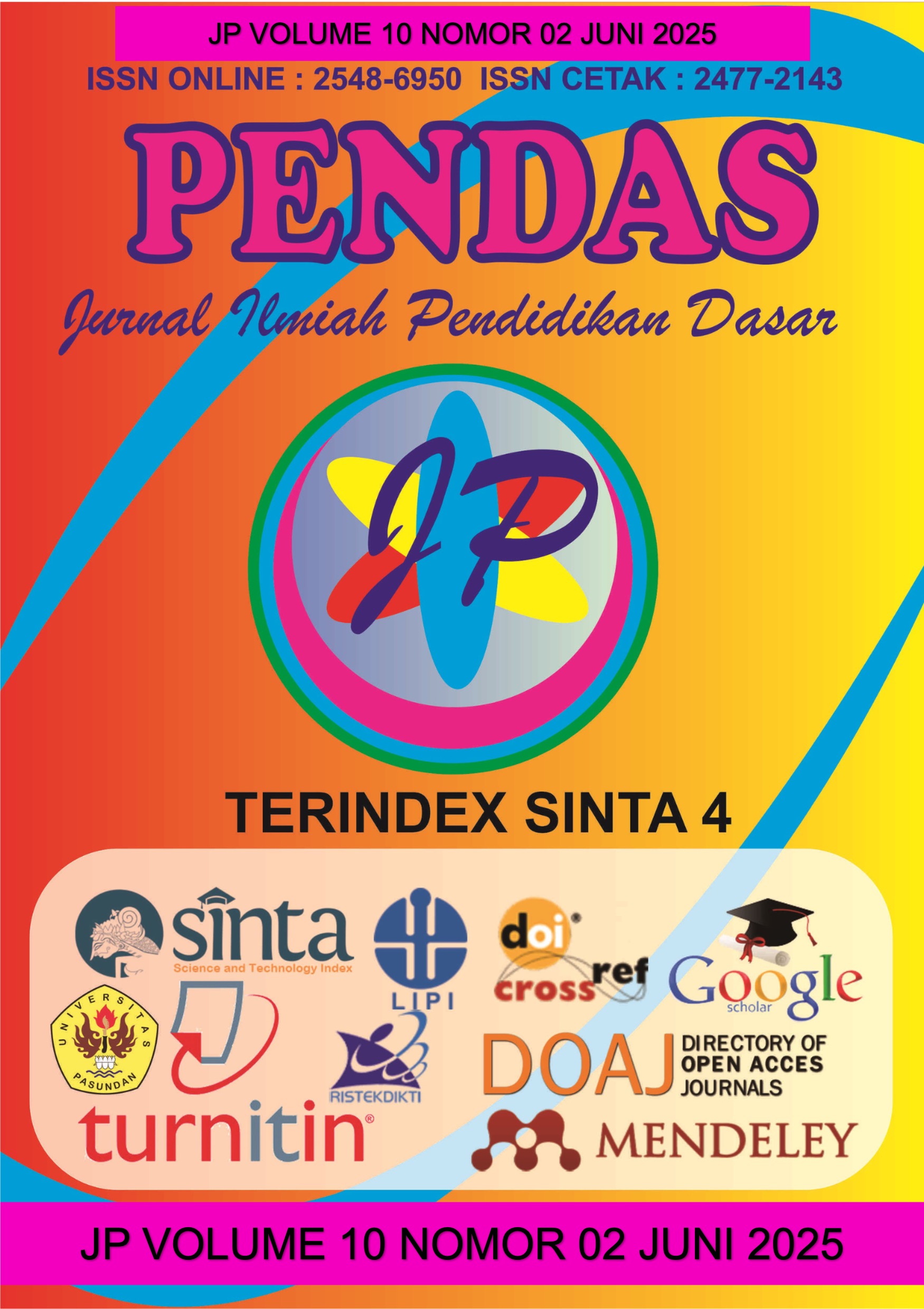DAMPAK MAKAN BERGIZI GRATIS TERHADAP MINAT BELAJAR SISWA KELAS 5 SD
DOI:
https://doi.org/10.23969/jp.v10i02.25526Keywords:
Education, Learning Interest, Free Nutritious MealsAbstract
The Free Nutritious Meal Program (MBG) is a strategic initiative that aims to improve
the nutritional quality and learning motivation of students in Indonesia. The program
is based on data showing that 41% of students in Indonesia experience hunger while
studying, which negatively impacts their concentration and academic performance.
The MBG not only targets school children, but has also been expanded to include
toddlers, pregnant women, and nursing mothers. The government has allocated a
budget of IDR71 trillion in the 2025 Draft State Budget for the initial phase of this
program, which is planned to begin on January 2, 2025. Interest is a tendency or
great desire for something, evidenced through giving attention to the subject of
interest. The Free Nutritious Meal Program (MBG) is one of the flagship initiatives
launched by President Prabowo Subianto's administration. The main objective of
the program is to address nutrition issues as well as improve the quality of human
resources in Indonesia, with a special focus on children and pregnant women. It is
also a school meal distribution plan that is expected to provide equity in education
as all students have the opportunity to eat nutritious meals for free. Since its
announcement, the implementation plan of this program has undergone various
developments. Of course, this will later have an impact on student learning
outcomes. In this study or Research we use the method.
Downloads
References
Prof. Dr. Ir. Raihan, M. si. (2017).
Metodologi Penelitian. Universitas
Islam Jakarta. Jakarta: Universitas
Islam Jakarta.
Rukminingsih, & dkk. (2020).
Metode Penelitian Pendidikan.
Penelitian Kuantitatif, Penelitian
Kualitatif, Penelitian Tindakan
Kelas. Journal of Chemical
Information and Modeling (Vol. 53
Yogyakarta: Erhaka Utama.
Siantajani, Y. (2021). Loose Parts
Material Lepasan Otentik Stimulasi
PAUD. Semarang: PT. Sarang
Seratus Aksara.
Ajeng Atikah Merlinda, Y. Y.
(2025a). Analisis Program Makan
Gratis Prabowo Subianto Terhadap
Strategi Peningkatan Motivasi
Belajar Siswa di Sekolah Tinjauan
dari Perspektif Sosiologi
Pendidikan. 7.
Ajeng Atikah Merlinda, Y. Y.
(2025b). Analisis Program Makan
Gratis Prabowo Subianto Terhadap
Strategi Peningkatan Motivasi
Belajar Siswa di Sekolah Tinjauan
dari Perspektif Sosiologi Pendidikan. Journal Multidisiplinary
Reasech and Development.
Andin, A., Risti, D., Latifah, I.,
Panuntun, M., Nur, M., Selviani, R.,
& Saptatiningsih, R. I. (2025).
Penerapan Nilai Pancasila Melalui
Program Makan Bergizi Gratis.
IJEDR: Indonesian Journal of
Education and Development
Research, 3(1).
Anisya Dwi Septiani, R., &
Wardana, D. (2022). Implementasi
Program Literasi Membaca 15
Menit Sebelum Belajar Sebagai
Upaya Dalam Meningkatkan Minat
Membaca. In AGUSTUS: Vol. V
(Issue 2).
Desiani, N., & Syafiq, A. (2025).
Efektivitas Program Makan Gratis
pada Status Gizi Siswa Sekolah
Dasar: Tinjauan Sistematis.
Malahayati Nursing Journal, 7(1),
27–48.
https://doi.org/10.33024/mnj.v7i1.1
7497
Fitriana, V., Cahyanti, L., Ratna
Yuliana, A., Hatin Holifah, Y.,
Cahyaningrum, Z., Rusmiyati, E.,
Studi, P. D., Teknologi Kesehatan
Cendekia Utama Kudus, I.,
Program Studi, M. D., & Teknologi
Kesehatan Cendekia Utama Kudus
vera, I. (2022). PENGETAHUAN
GIZI SEIMBANG ANAK USIA
SEKOLAH DASAR DALAM
MENINGKATKAN KONSENTRASI
BELAJAR. JABI: Jurnal Abdimas
Bhakti Indonesia, 3(2).
Info guru. (n.d.). modul ajar
kurikulum merdeka. Retrieved
March 18, 2025, from https://www.rpp-silabus.com/2012/06/pengertian-siswa-dan-istilahnya.html?m=1
Kartika Sari, A., & Dora, N. (2024).
Konsentrasi Belajar Siswa Ditinjau
dari Peran Orang Tua Dalam
Persiapan Pola Makan dan
Kecukupan Gizi. Jurnal Ilmiah
Bimbingan Konseling Undiksha,
15(1), 59–66.
https://doi.org/10.23887/jibk.v15i1.
80489.
Bundy, D. A., Silva, N. D., Horton,
S., Jamison, D. T., & Patton, G.
C.(2018). Optimizing education
outcomes:High-return investments
in school health for increased
participation and learning.
Washington, DC: World Bank.
Creswell, J. W., & Poth, C. N.
(2018).
Qualitative inquiry and research
design:Choosing among five
approaches (4th ed.). SAGE
Publications. FAO. (2022). The state
of food security and nutrition in the
world. Food and Agriculture
Organization of the United Nations.
Glewwe, P., & Muralidharan, K.
(2021).Improving education outcomes
in developing countries: Evidence,
knowledge gaps, and policy
implications. Handbook of Labor
Economics, 5, 653-743.
Grantham-McGregor, S., Cheung,
Y. B., Cueto, S., Glewwe, P.,
Richter, L., & Strupp, B. (2007).
Developmental potential in the first
5 years for children in developing
countries. The Lancet, 369(9555),
60-70.Grantham-McGregor, S.,
Cheung, Y. B., Cueto, S., Glewwe, P., Richter, L., & Strupp, B. (2007).
Developmental
potential in the first 5 years for
children in developing
countries. The Lancet,
369(9555), 60-70.
Downloads
Published
Issue
Section
License
Copyright (c) 2025 Pendas : Jurnal Ilmiah Pendidikan Dasar

This work is licensed under a Creative Commons Attribution 4.0 International License.














































